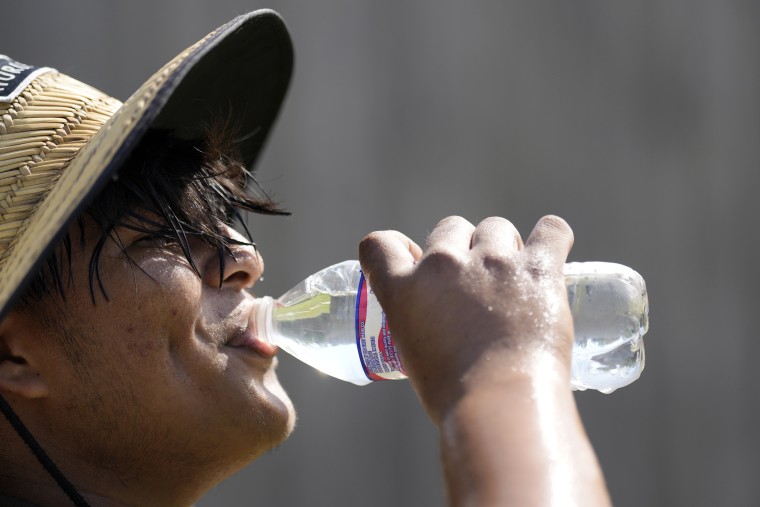A heat dome is causing millions to suffer in the South (and also in Mexico) and millions of people are expected to face heat alerts, not only in the South and Southeast, but also the Midwest and California. The Webb County Medical Examiner in Texas on Wednesday reported at least 11 heat-related deaths. How can we keep them healthy amid this wave of extreme temperatures?
🥵 How does heat affect health?
Swelling, tiredness, dehydration, cramps, exhaustion or heat stroke... Heat affects our health and can even cause heat stroke.
It is a disorder caused by excess heat in the body, usually as a result of prolonged exposure to high temperatures or physical exertion in high temperatures, according to the Mayo Clinic health system.
This is the most serious form of heat injury and can occur if your body temperature reaches 104°F (40°C) or higher. It requires emergency treatment, and if left untreated can quickly damage the brain, heart, kidneys, and muscles. The damage gets worse the longer treatment is delayed, increasing the risk of serious complications or death.
Carlos Rodriguez drinks water as he takes a break from digging holes for fence poles, Tuesday, June 27, 2023, in Houston.David J. Phillip/AP
👶 Who is most vulnerable to heat?
Some people are at higher risk of developing heat-related illness, such as adults 65 and older, people with chronic illnesses, people who work outdoors, infants and children, as well as athletes, according to the Red Cross.
People with heart disease, poor blood circulation, obesity, mental illness, or those taking certain medications are also especially vulnerable.
Then... What can be done?
Why do your hands and feet swell in the heat and how can you avoid it?
June 28, 202301:25
🌊 Stay hydrated
- The Centers for Disease Control and Prevention (CDC) says it very clearly: drink plenty of fluids. Drink more fluids than you usually do, no matter how active you are. Don't wait until you're thirsty to do it. (If your doctor limits the amount you drink or prescribes diuretics, ask how much you should drink in hot weather.)
- Avoid very sugary, caffeinated, or alcoholic beverages, as these cause you to lose more body fluid. Also avoid very cold drinks, because they can cause stomach cramps.
- Replenish salt and minerals: Excessive sweating removes salt and minerals from the body that need to be replaced. A sports drink can replenish the salt and minerals you lose through sweat. If you follow a low-salt diet, have diabetes, hypertension or other chronic conditions, talk to your doctor before taking a sports drink or salt tablets.
Authorities ask to be alert in the children's areas of the parks before the heat wave
June 28, 202300:53
🥒 What to eat
- Avoid heavy meals: Make light meals that help replenish salts lost through sweat (salads, fruits, vegetables, juices, etc.).
- Experts recommend foods rich in water such as: cucumber -it is the solid food with the highest water content-, iceberg lettuce, celery, radish, green pepper, cauliflower, spinach, broccoli, watermelon, berries (strawberries, raspberries, blueberries and blackberries).
❄️ Stay in cool places
- Stay in an air-conditioned place as much as possible, the CDC recommends. If there is no air conditioning in your home, go to a shopping mall or public library; Even spending a few hours in an air-conditioned place can help your body stay cooler when you get back in the heat. Call your local health department to see if there are heat shelters in your area.
- Electric fans can provide comfort, but when the temperature is above 90 degrees, they will not prevent heat-related illnesses.
- Take a cold bath to cool off.
- Use the stove and oven less to maintain a cooler temperature in your home.
We enter a powerful heat dome to understand how the one that hits the South of the country works
June 27, 202301:38
🚴 ♀️ Avoid outdoor activities
- Carefully schedule outdoor activities: Try to limit your activity to times when it's cooler, such as morning and evening. Rest often in shaded areas so your body has a chance to recover.
- Go at your own pace: Reduce exercise during the heat. If you're not used to working or exercising in a hot environment, start slowly and increase your pace gradually. If exertion with heat causes your heart to pound and you become short of breath, stop all activity. Go to a cool area or in the shade and rest, especially if you feel dizzy, confused, weak, or faint.
👒 Protect yourself from the sun
More than 50 million people are at risk from the heat wave in the southeast of the country
June 27, 202300:24
- Wear lightweight, loose-fitting clothing that lets you sweat. Long pants help block most of the sun's radiation. Light colored cotton shirts are a good choice. Remember that clothing should be comfortable and not too tight.
- Decrease body parts directly exposed to the sun.
- Wear sunscreen: Sunburn affects the body's ability to cool down and can lead to dehydration. Look for protectors that say "broad spectrum" or "UVA/UVB protection" on their labels, these products are the ones that work best.
- If you must go outdoors, protect yourself from the sun by wearing a wide-brimmed hat, or cap, and sunglasses.
- Be careful in exposures over and in water, as radiation can penetrate up to one meter into clear water.
- Do not forget that the risk of sunburn increases with height (every 300 meters, the power of ultraviolet radiation increases by 4%) so in the mountains you should follow the same tips to protect yourself from the sun.

